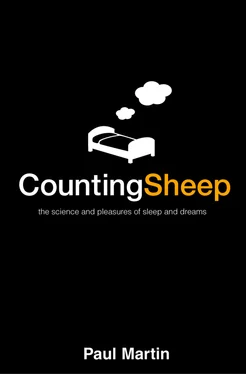Despite the apparent convenience of being able to sleep and stay awake simultaneously, very few mammals are capable of unihemispheric sleep. The biological benefits of sleeping with only half of the brain at a time presumably outweigh the disadvantages only under unusual conditions, such as those encountered by air-breathing mammals living in the deep oceans.
Unihemispheric sleep is widespread in birds, however. They do it for a. different biological reason. Sleeping with half the brain awake and one eye open allows them to sleep while simultaneously remaining vigilant for predators. In birds, each eye exclusively feeds the visual processing areas in the opposite half of the brain: thus, all the nerve fibres coming from the right eye connect to the left hemisphere of the brain and vice versa. When a bird is in unihemispheric sleep its open eye is the one corresponding to the waking half of the brain, while the closed eye is connected to the sleeping half. If a bird feels relatively safe, it closes both eyes, and both sides of its brain go to sleep.
An experiment with mallard ducks demonstrated how unihemispheric sleep helps birds to stay safe from predators. Four ducks were placed in a row along a perch, the idea being that the ducks at either end of the row would feel more vulnerable to predators than the two in the middle. In the natural world it is generally a bad idea to be on the edge of a group if you might end up as some other animal’s dinner. As predicted, video recordings showed that the outer two birds were much more likely to sleep with one eye open than the two on the inside; their unihemispheric sleep increased by 150 per cent. The amount of unihemispheric sleep rose further when the ducks were shown frightening video images of an approaching predator.
The relationship between unihemispheric sleep and vigilance was finely controlled. The exposed birds on the ends of the row preferentially opened their outward-facing eye – the one directed towards potential danger. From time to time, a bird would turn round and switch eyes, so that the open eye was still the one facing out. Simultaneous recordings of brain activity confirmed that the brain hemisphere corresponding to the open eye was always awake, while the hemisphere corresponding to the closed eye was the one in deep sleep.
The one-eyed tactic was effective: when an attacking predator was simulated on a video screen, the birds sleeping with one eye open were able to react in a fraction of a second – far faster than if they had been in deep sleep with both eyes shut.
Humans are not capable of unihemispheric sleep, although at least one writer has played with the fantasy. Damon Runyon wrote of how he once played cards with a fading champion card player who now lacked the stamina to stay awake during marathon games of gin rummy lasting eight or ten hours. When the man lost a game after making a bad play, the punters betting on him to win clamoured to remove their bets from the next game, on the grounds that he was asleep. Then someone pointed out that the allegedly sleeping player’s eyes were open, so he must be awake. ‘The one on your side is’, retorted one of the backers, ‘but the one on the other side is closed. He is sleeping one-eye.’
Like all other forms of pleasure, sleep may become a passion.
Jean-Anthelme Brillat-Savarin, The Physiology of Taste (1825)
Sleep is far more than just a biological necessity. It is also a neglected source of pleasure. Consider this. Activities that are biologically important for survival and reproduction tend to be enjoyable: think of sex, or eating, or drinking, or being successful. Pleasure is one of nature’s ways of ensuring that animals do enough of the right things. Whatever happened to sleep? It is clearly essential for survival, and yet for many people it is merely a maintenance activity that brings little positive enjoyment. They sleep because they have to rather than because they want to.
In some respects, sleep has acquired the dismal status that eating had in post-war Britain, where austerity and a cultural blind spot reduced the culinary arts to a joyless act of refuelling. Bland, fatty food was daily shovelled in to keep the boilers stoked, with scant attention paid to its preparation or enjoyment. Fortunately, Britain has since developed more enlightened (if not self-indulgent) attitudes to food, and recent decades have witnessed cooking and eating emerge as pleasurable activities in their own right. For some people in wealthy nations, cooking and eating have become more a form of entertainment than a biological function.
Meanwhile, sleep is mired in the cultural equivalent of a 1950s British canteen meal: an inadequate and faintly unhealthy affair, indifferently concocted and consumed with more haste than enjoyment. Too many people regard sleep as the brain’s equivalent of fast food or overboiled cabbage. If gastronomy is ‘the reasoned comprehension of everything connected with the nourishment of man’, as it was originally defined, then should we not start thinking about sleep in the same way? I hope that by the end of this book you will be pondering the gourmet delights of sleeping, napping and dreaming, and starting to savour more of their lost pleasures for yourself.
PART II Insufficiencies
She looked a little worn out, a little tired, but, then again, didn’t everybody? We all look a bit tired, these days, some more than others.
William Boyd, Armadillo (1998)
Many of us in our everyday lives are getting sleep of inadequate quantity and quality, and this is bad for our mental and physical health. Lack of sleep makes us inefficient at work, dangerous behind the wheel of a car and unattractive to be with; it lowers the quality of our lives, causes accidents and makes us more vulnerable to illness. And it is unpleasant.
I am not referring here to the acute sleep deprivation that comes from occasionally staying up all night, although that is common enough in professions such as medicine, the military and politics. Rather, I am talking about the chronic sleep deprivation that accumulates as we continually stint ourselves of sleep, day in and day out, because of the conflicting demands of work and leisure, or because of a sleep disorder, or just because we do not think sleep is important. So, what are the reasons for believing that sleep deprivation is a real problem?
Eight hours they give to sleep.
Sir Thomas More, Utopia (1551)
The evidence that chronic sleep deprivation is a common feature of contemporary life comes in several interlinked strands. We will start with perhaps the most obvious one of all: the observation that many people feel sleepy when they are awake.
Assessing the extent of daytime tiredness in society is tricky, not least because so many people have come to regard feeling tired as normal. Nonetheless, numerous scientific studies have unearthed evidence that the problem is real and widespread. For example, a 2001 poll of Americans’ sleeping habits found that 22 per cent of adults felt so sleepy during the day that it interfered with their activities. A 1994 survey found that 5 per cent of the British population were experiencing severe daytime sleepiness, while a further 15 per cent felt moderately sleepy during the day. It also found that the people suffering from daytime sleepiness were twice as likely to have a vehicle accident.
A similar picture has emerged from other countries. For instance, a recent study discovered that 10 per cent of middle-aged Finns were excessively tired and tended to fall asleep unintentionally during the day. Their sleepiness was statistically associated with an array of nasty things, including a heightened risk of traffic accidents, premature retirement, depression and anxiety. In Sweden, 9 per cent of adults were found to be suffering from daytime sleepiness, while a survey in Warsaw recorded that 21 per cent of adults felt moderately sleepy during the day. Australian researchers detected excessive daytime sleepiness in 11 per cent of adults. You get the picture. Not even the youngest and healthiest are immune. A French investigation of 58,000 army conscripts discovered that 5 per cent of these fit young men were affected by excessive daytime sleepiness and 14 per cent of them were sufficiently tired to sleep during the day.
Читать дальше












